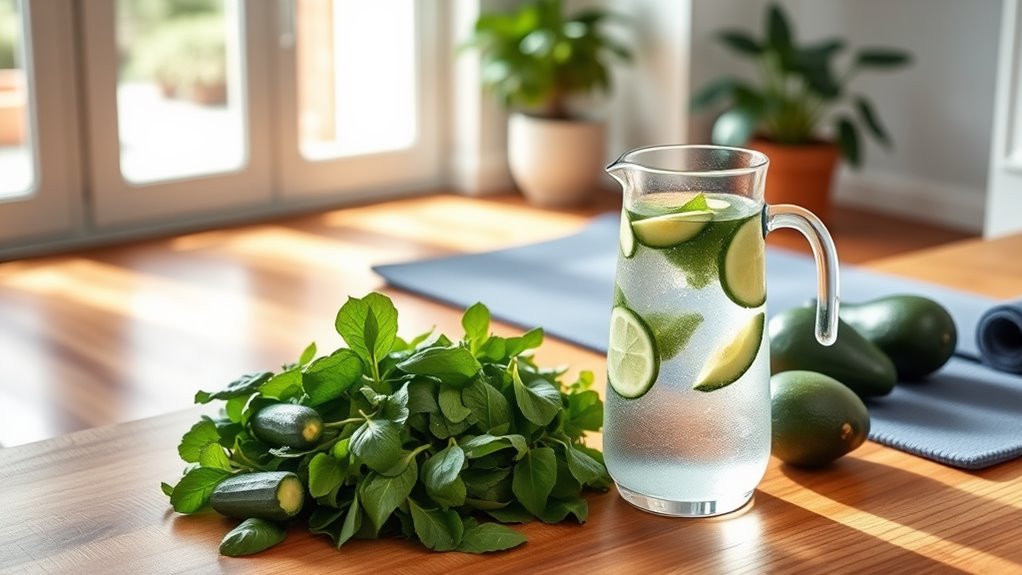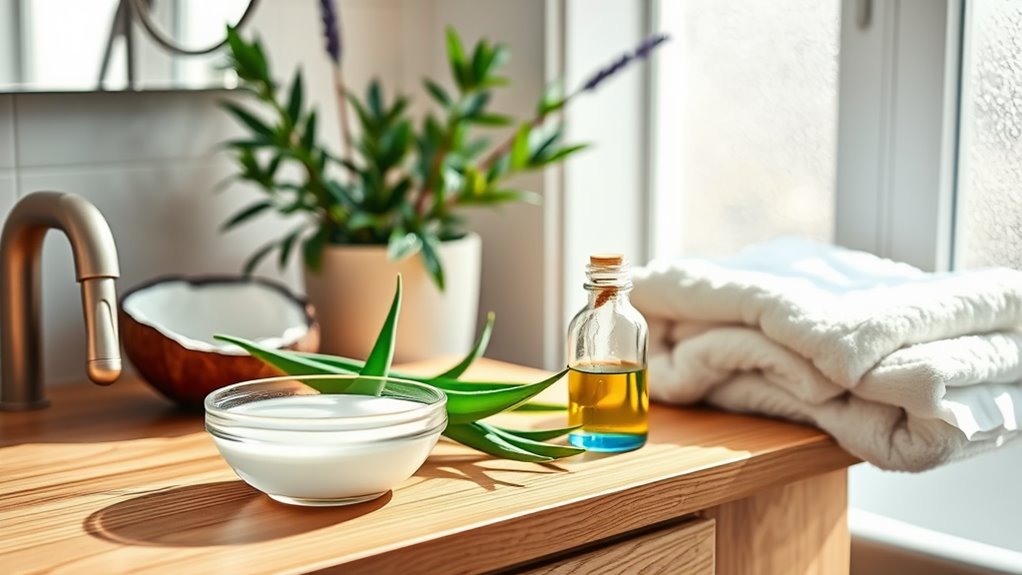Get Rid of Bloat Naturally With This Simple Routine
Did you know that around 30% of adults experience bloating regularly? This uncomfortable condition can stem from various factors, including diet and lifestyle choices. Fortunately, there are natural ways to ease this discomfort without relying on medications. By incorporating simple changes to your daily routine, you can find relief and improve your digestive health. Curious about how to get started? Let’s explore effective strategies that can make a real difference.
Key Takeaways
- Stay hydrated by drinking plenty of water to flush out excess salt and improve digestion.
- Practice mindful eating by chewing slowly and savoring each bite to reduce overeating and discomfort.
- Incorporate gentle exercises like walking or yoga to promote digestion and alleviate bloating.
- Sip on herbal teas like peppermint or ginger to soothe the stomach and reduce gas.
- Identify and avoid personal food triggers to prevent future bloating episodes.
Understanding Bloating: Causes and Symptoms
Bloating can be an uncomfortable and frustrating experience, especially if you don’t understand what’s causing it. Many factors can contribute to a bloated belly, including overeating, eating gas-producing foods, or swallowing air while eating.
You might also experience bloating due to food intolerances or digestive disorders. Symptoms often include a feeling of fullness, tightness, or visible swelling in your abdomen. Eating too quickly can also exacerbate these symptoms.
To alleviate this discomfort, consider trying some bloated belly remedies. Simple lifestyle changes, like eating smaller meals, avoiding carbonated drinks, or incorporating ginger and peppermint tea, can help. Additionally, engaging in gentle movement like walking or yoga may assist in relieving gas and promoting digestion. Understanding these causes and remedies will empower you to tackle bloating more effectively.
Importance of Hydration in Reducing Bloat
Staying hydrated is essential for keeping bloat at bay, as water helps flush out excess salt and toxins from your body. By increasing your water intake, you can promote better digestion and reduce discomfort. Herbal teas can also be a soothing addition, offering natural benefits that aid in alleviating bloating. Additionally, proper hydration aids in food breakdown and nutrient absorption, ensuring that your digestive system functions efficiently. Maintaining good hydration levels can also help reduce bloating triggers that may arise from certain foods.
Water Intake Benefits
Proper hydration is essential for keeping bloat at bay. Drinking enough water helps your body function properly and can greatly reduce bloating.
When you’re well-hydrated, your body maintains fluid balance, which means it won’t hold onto excess water.
Here are some key benefits of water intake:
- Flushes out excess sodium
- Supports digestion and nutrient absorption
- Reduces constipation, a common bloat trigger
- Helps maintain healthy skin and reduces puffiness
- Keeps your metabolism functioning efficiently
Herbal Teas Effectiveness
While you’re focusing on hydration to combat bloat, incorporating herbal teas into your routine can be a game-changer. These soothing beverages not only help you stay hydrated but also offer unique benefits that target bloating. Herbal teas like peppermint and ginger enhance digestion and reduce gas, making you feel lighter and more comfortable.
| Herbal Tea | Benefits |
|---|---|
| Peppermint | Relieves gas and indigestion |
| Ginger | Improves digestion |
| Chamomile | Reduces inflammation |
| Fennel | Eases bloating |
| Dandelion | Acts as a natural diuretic |
Dietary Changes to Alleviate Bloating
Making simple dietary changes can markedly reduce bloating and make you feel more comfortable.
Start by incorporating these tips into your daily routine:
-
Stay Hydrated: Drink plenty of water to help flush out excess sodium.
-
Limit Salt Intake: Cut back on processed foods high in sodium.
-
Eat Smaller Meals: Try having smaller, more frequent meals instead of large ones.
-
Include Probiotics: Add yogurt or fermented foods to support gut health.
-
Choose High-Fiber Foods: Opt for fruits, vegetables, and whole grains to aid digestion. Additionally, high-fiber foods can lead to bloating, especially after recent increases in intake.
Effective Herbal Remedies for Digestive Health
When you’re looking for natural ways to ease bloating and promote digestive health, herbal remedies can be a powerful ally.
Ginger is a fantastic option, known for its ability to soothe the stomach and reduce gas. Simply brew ginger tea or chew on a small piece of fresh ginger. Additionally, ginger can help with irregular bowel movements, making it a versatile choice for digestive support.
Peppermint is another effective remedy; its menthol properties can relax your digestive tract, helping to alleviate discomfort. You can sip on peppermint tea or take enteric-coated capsules.
Fennel seeds are also great for reducing bloating; try chewing on them after meals or steeping them in hot water.
Finally, chamomile tea not only calms your stomach but also reduces inflammation, making it a comforting choice. Additionally, probiotics maintain a balanced gut environment, which can further support your digestive health and reduce bloating.
Incorporating these herbs can promote a happier, healthier gut.
The Role of Probiotics in Reducing Bloat
Probiotics play an essential role in maintaining a balanced gut microbiome, which can greatly reduce bloating. By introducing beneficial bacteria into your digestive system, you can enhance digestion and minimize uncomfortable gas buildup.
Here are some practical ways probiotics help:
-
Restores gut balance: They combat harmful bacteria and promote healthy flora.
-
Improves digestion: Probiotics aid in breaking down food more efficiently, leading to better nutrient absorption.
-
Reduces gas production: They help digest complex carbohydrates, minimizing gas.
-
Boosts nutrient absorption: A balanced gut helps you absorb essential vitamins and minerals.
-
Supports immune health: A healthy gut can strengthen your immune system, further reducing digestive issues.
Additionally, incorporating fiber-rich foods into your diet can complement the effects of probiotics, leading to a more comfortable and healthier digestive experience.
Simple Breathing Techniques to Relieve Discomfort
When you’re feeling bloated, simple breathing techniques can make a big difference.
Deep belly breathing and diaphragmatic exercises help you relax and encourage better digestion.
Let’s explore how you can use these methods to relieve discomfort effectively.
Deep Belly Breathing
Although bloat can be uncomfortable, practicing deep belly breathing offers a simple yet effective way to alleviate discomfort. This technique helps activate your diaphragm, promoting relaxation and easing tension in your abdomen.
Here’s how you can do it:
- Find a quiet, comfortable space.
- Sit or lie down in a relaxed position.
- Place one hand on your chest and the other on your belly.
- Inhale deeply through your nose, allowing your belly (not your chest) to rise.
- Exhale slowly through your mouth, feeling your belly fall.
Try to practice this for a few minutes daily.
You’ll not only relieve bloating but also improve your overall sense of well-being. So take a moment, breathe deeply, and feel the difference!
Diaphragmatic Breathing Exercises
Building on the benefits of deep belly breathing, diaphragmatic breathing exercises can further enhance your ability to relieve discomfort and reduce bloat. By focusing on your diaphragm, you promote better oxygen flow and relaxation, which helps ease gastrointestinal tension. Here’s a quick guide to get you started:
| Step | Action |
|---|---|
| 1. Sit or lie down | Find a comfortable position |
| 2. Inhale deeply | Breathe in through your nose, expanding your belly |
| 3. Hold | Pause for a moment |
| 4. Exhale slowly | Breathe out through your mouth, letting your belly fall |
| 5. Repeat | Do this for 5-10 minutes |
Integrate these exercises into your routine, and you’ll likely notice a difference in how you feel.
Incorporating Gentle Exercise Into Your Routine
Incorporating gentle exercise into your routine can considerably alleviate feelings of bloat and improve overall digestion. Activities like walking, stretching, or yoga can stimulate your digestive system and help you feel more comfortable. Regular movement can also enhance immune response and overall wellness.
Here are some easy ways to get started:
-
Take a daily walk****: Aim for at least 20 minutes to get your blood flowing.
-
Try gentle yoga poses****: Focus on poses that promote digestion, like the Child’s Pose or Cat-Cow.
-
Incorporate stretching: Simple stretches can relieve tension in your abdomen.
-
Engage in light swimming****: The buoyancy can ease pressure while getting you moving.
-
Practice tai chi: This slow-motion exercise offers relaxation and promotes digestion. Additionally, engaging in regular movement can help reduce gas and bloating after meals.
The Benefits of Mindful Eating
Mindful eating can greatly enhance your digestion process by encouraging you to savor each bite and listen to your body’s cues.
It also promotes healthier relationships with food, helping you build a positive mindset around meals.
Enhance Digestion Process
While many people rush through meals, taking a moment to eat mindfully can greatly enhance your digestion process. By slowing down and savoring each bite, you allow your body to properly process food, making it easier to absorb nutrients and prevent discomfort.
Here are some benefits of mindful eating for digestion:
-
Improved satiety: You’ll recognize when you’re full, reducing overeating.
-
Better digestion: Chewing thoroughly helps break down food, aiding digestion.
-
Reduced bloating: Mindful eating can minimize air swallowing, which often leads to bloating.
-
Enhanced flavor appreciation: You’ll enjoy your food more, making meals more satisfying.
-
Stress reduction: Focusing on your meal can decrease stress levels, promoting a healthier gut.
Embrace mindful eating today for a happier, healthier digestive system!
Promote Healthy Relationships
Eating mindfully not only benefits your digestion but also fosters healthier relationships with those around you. When you focus on your food, you become more present during meals, which enhances conversations and connections.
By actively engaging with your food and those at your table, you create a shared experience that strengthens bonds. Mindful eating encourages you to listen to your body’s hunger cues, which can lead to more considerate and intentional eating habits.
This practice helps you avoid distractions, allowing you to appreciate your meal and those you’re dining with. As you cultivate awareness, you’ll find that your interactions become more genuine, leading to deeper connections and a positive atmosphere.
Increase Food Awareness
Awareness of your food choices can transform your dining experience and overall well-being.
By practicing mindful eating, you’ll not only enjoy your meals more but also support your digestive health.
Begin by tuning into your body’s hunger cues and savoring each bite.
Here are some benefits of increasing your food awareness:
- Enhances digestion: Eating slowly allows your body to process food better.
- Reduces overeating: You’ll be more attuned to when you’re satisfied.
- Improves food choices: Mindfulness helps you select healthier options.
- Boosts enjoyment: You’ll appreciate flavors and textures more.
- Supports emotional health: It fosters a healthier relationship with food.
Incorporate these practices into your meals, and watch your bloat diminish naturally!
Natural Supplements to Consider
Bloating can be uncomfortable and frustrating, but natural supplements offer a straightforward way to alleviate this issue.
Consider trying probiotics, which help balance gut bacteria and improve digestion. Probiotics help maintain a healthy gut microbiome and inhibit harmful yeast growth, making them a valuable addition to your routine. Digestive enzymes can also be beneficial, as they aid in breaking down food more effectively, reducing gas and bloating.
Peppermint oil is another option; it relaxes the intestinal muscles, easing discomfort. Ginger is well-known for its anti-inflammatory properties and can help soothe your digestive system.
Finally, fennel seeds may relieve bloating by promoting the expulsion of gas. Additionally, incorporating probiotic-rich foods into your diet can further enhance gut health and digestion.
Always consult with a healthcare professional before starting any supplement to guarantee it’s right for you. With these natural options, you can take proactive steps toward feeling more comfortable in your body.
Creating a Personalized Bloat-Relief Routine
When you take the time to create a personalized bloat-relief routine, you’ll not only tackle discomfort but also enhance your overall digestive health.
Start by identifying your triggers, whether it’s certain foods or stress.
Consider incorporating these elements into your routine:
- Hydration: Drink plenty of water throughout the day.
- Mindful Eating: Chew food slowly and savor each bite.
- Gentle Movement: Incorporate light exercises like walking or yoga.
- Herbal Teas: Sip on peppermint or ginger tea to soothe your stomach, as warm ginger tea can also alleviate throat discomfort.
- Probiotics: Add fermented foods or supplements to support gut health.




